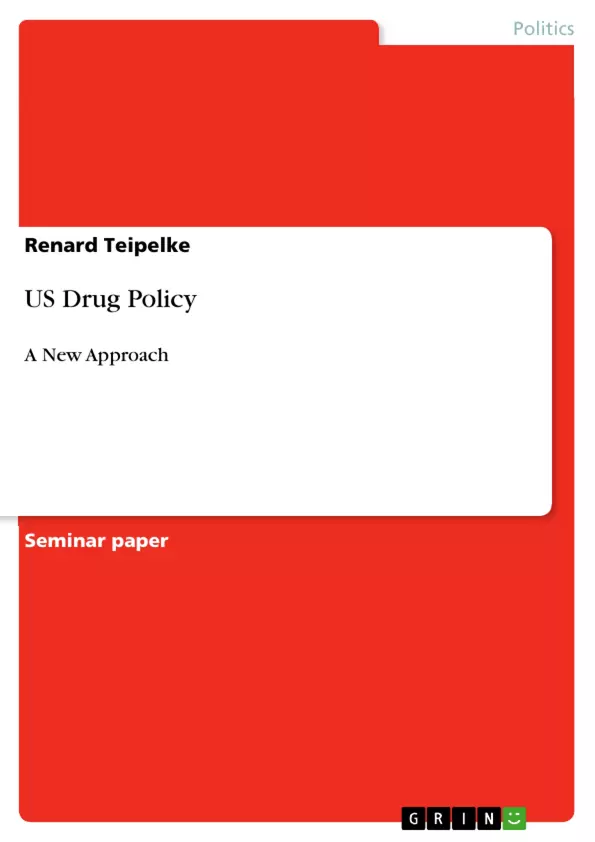The US likes to fight ‘wars’ when it faces huge challenges: Lyndon B. Johnson fought the ‘war on poverty,’ George W. Bush started the ‘war on terrorism,’ and Richard M. Nixon first talked about the ‘war on drugs.’ One can discuss if these wars failed; however, none of these battles can be framed as a total success. It can be assumed that these long-term overarching wars were better fought on a lower level with less ambitious but more practicable goals.
With regard to the US prohibitionist policy on certain psychoactive substances, I will evaluate the US ‘war on drugs.’ Before taking a closer look at the data, I will outline the criteria which should be used to guide public policy in the area of psychoactive substances. The scrutiny of the statistics of the drug phenomenon in the US will then lead to my analysis of possible policy solutions for those fields where the ‘war on drugs’ has not been successful. The standpoints and arguments of different interest groups in the public policy field will be discussed, and strategies for coalition building outlined. In a further step, I will describe how international policies can support my public policy. Different types of evidence to assess the future progress of my policy advices will conclude my analysis and will be followed by an outlook.
Inhaltsverzeichnis (Table of Contents)
- Introduction
- Criteria for Guiding Public Policy in the Area of Psychoactive Substances
- The US 'War on Drugs'
- Evaluation of the US Drug Policy
- Lack of Progress and Failure of the US Drug Policy
- Analysis of a Public Policy on Drugs
- Cost Increase for Alcohol Consumption and Crimes under the Involvement of Alcohol
- Decriminalization of Marijuana on the State Level
- Professional Programs in Schools to Raise Risk Awareness
- Extension of Psychological Services for Students in Educational Institutions
- Supportive International Policies
- Evidence for Assessing the Progress of a Public Policy on Drugs
- Conclusion & Outlook
Zielsetzung und Themenschwerpunkte (Objectives and Key Themes)
This paper evaluates the US 'War on Drugs' from a rational choice perspective, emphasizing public health as a primary criterion for policy formulation. It analyzes the success, progress, or failure of the prohibitionist policy on certain psychoactive substances in the US.
- The effectiveness of the US 'War on Drugs'
- The impact of drug policy on public health
- The role of rational choice theory in shaping drug policy
- Alternative public policy solutions for addressing drug-related issues
- The potential of international policies to support drug policy changes
Zusammenfassung der Kapitel (Chapter Summaries)
The introduction provides context for the US 'War on Drugs,' highlighting its similarities to other historical 'wars' and suggesting a need for more targeted and achievable goals. The paper then outlines criteria for guiding public policy in the area of psychoactive substances, focusing on rational choice theory and harm reduction principles.
Chapter 3 analyzes the US drug policy, examining data on drug consumption by youth and the general population. It highlights the mixed success of the policy, with some drugs showing decline in use while others remain at high levels. Chapter 4 explores alternative policy solutions such as increased costs for alcohol consumption, decriminalization of marijuana, and expanded psychological services for students. The paper also discusses how international policies can support these reforms.
The final chapter outlines evidence for assessing the progress of a public policy on drugs and provides an outlook on potential future directions for drug policy in the US.
Schlüsselwörter (Keywords)
The primary focus of this paper is on the effectiveness of the US 'War on Drugs,' public health considerations, rational choice theory, harm reduction principles, and alternative policy solutions. It explores issues related to drug use, crime, and international cooperation in the context of drug policy.
Frequently Asked Questions
Has the US 'War on Drugs' been successful?
The paper suggests that while some drugs showed a decline in use, the overall prohibitionist policy has faced significant lack of progress and failure.
What is the "rational choice perspective" in drug policy?
It is a framework that emphasizes public health and harm reduction principles as primary criteria for formulating drug policies.
What alternative solutions are proposed?
Alternatives include the decriminalization of marijuana at the state level, increased costs for alcohol, and professional risk awareness programs in schools.
How can international policies support US drug reform?
International cooperation and shared evidence-based strategies can help transition from prohibition toward a public health-oriented approach.
What role does mental health play in this policy analysis?
The extension of psychological services for students in educational institutions is seen as a key strategy to address the root causes of drug abuse.
- Quote paper
- Renard Teipelke (Author), 2010, US Drug Policy, Munich, GRIN Verlag, https://www.grin.com/document/149678



